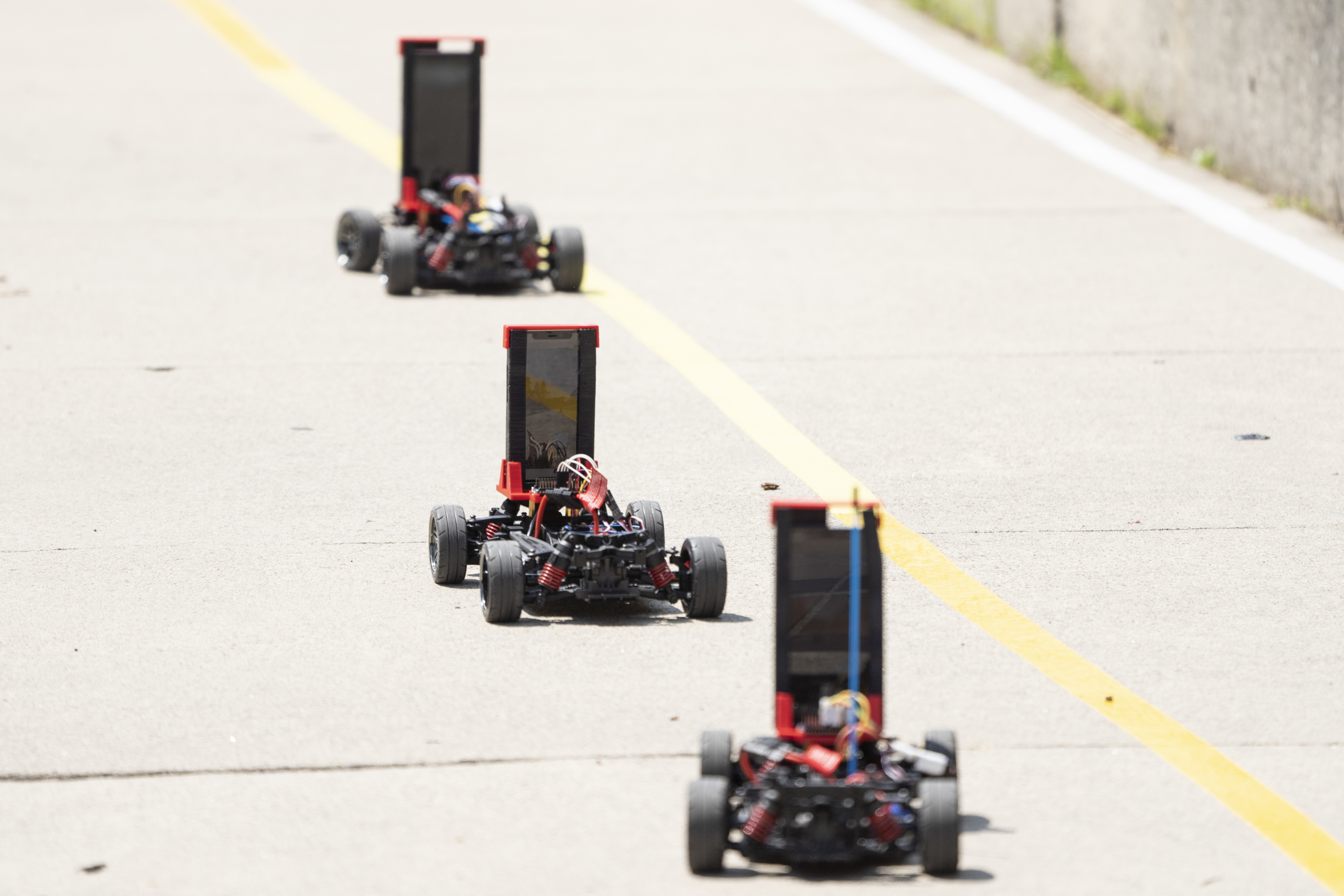Parts of the UC Berkeley campus were converted into a racecourse for high school students on Saturday (Aug. 14) as part of a Robot Open Autonomous Racing (ROAR) competition. The event capped the summer ROAR Academy in which dozens of students worked with autonomous driving algorithms and tested them in Python-based environments.
The ROAR competition began three years ago as part of courses offered to undergraduates as well as to Master of Engineering students. Last year, the pandemic forced the conversion of the program into an online-only format. This year, the instructors adapted the program to ROAR Academy, a rigorous two-week summer program available to high school students.
Allen Yang, executive director of the FHL Vive Center for Enhanced Reality and chair of the ROAR Academy, said the ROAR program has three distinct racing leagues. The S1 Series will focus on testing autonomous AI algorithms through a Python-based racing simulation environment. The V1 Series will enable contenders to manually race their vehicles in virtual reality, akin to an e-sports platform. The A1 Series puts the AI programming to the test using RC cars in a 10-lap competition.
“Sunday’s event was simply a way to reward students who took part in the ROAR Academy by giving them a fun way to learn the mechanics of vehicle control,” said Yang.
Source: Berkeley Engineering News

High school students race RC cars, marking the end of the first annual ROAR (Robot Open Autonomous Racing) Academy at UC Berkeley in Berkeley, Calif. on Saturday, Aug. 14, 2021. Allen Yang, executive director of the FHL Vive Center for Enhanced Reality and engineering graduate students converted Trefethen Terrace into a racecourse for dozens of high school students, capping off the summer outreach program in which participants worked with autonomous driving algorithms and tested them in Python-based environments. (Photo by Adam Lau/Berkeley Engineering) 
High school students race RC cars, marking the end of the first annual ROAR (Robot Open Autonomous Racing) Academy at UC Berkeley in Berkeley, Calif. on Saturday, Aug. 14, 2021. Allen Yang, executive director of the FHL Vive Center for Enhanced Reality and engineering graduate students converted Trefethen Terrace into a racecourse for dozens of high school students, capping off the summer outreach program in which participants worked with autonomous driving algorithms and tested them in Python-based environments. (Photo by Adam Lau/Berkeley Engineering) 
High school students race RC cars, marking the end of the first annual ROAR (Robot Open Autonomous Racing) Academy at UC Berkeley in Berkeley, Calif. on Saturday, Aug. 14, 2021. Allen Yang, executive director of the FHL Vive Center for Enhanced Reality and engineering graduate students converted Trefethen Terrace into a racecourse for dozens of high school students, capping off the summer outreach program in which participants worked with autonomous driving algorithms and tested them in Python-based environments. (Photo by Adam Lau/Berkeley Engineering) 
High school students race RC cars, marking the end of the first annual ROAR (Robot Open Autonomous Racing) Academy at UC Berkeley in Berkeley, Calif. on Saturday, Aug. 14, 2021. Allen Yang, executive director of the FHL Vive Center for Enhanced Reality and engineering graduate students converted Trefethen Terrace into a racecourse for dozens of high school students, capping off the summer outreach program in which participants worked with autonomous driving algorithms and tested them in Python-based environments. (Photo by Adam Lau/Berkeley Engineering) 
High school students race RC cars, marking the end of the first annual ROAR (Robot Open Autonomous Racing) Academy at UC Berkeley in Berkeley, Calif. on Saturday, Aug. 14, 2021. Allen Yang, executive director of the FHL Vive Center for Enhanced Reality and engineering graduate students converted Trefethen Terrace into a racecourse for dozens of high school students, capping off the summer outreach program in which participants worked with autonomous driving algorithms and tested them in Python-based environments. (Photo by Adam Lau/Berkeley Engineering) 
High school students race RC cars, marking the end of the first annual ROAR (Robot Open Autonomous Racing) Academy at UC Berkeley in Berkeley, Calif. on Saturday, Aug. 14, 2021. Allen Yang, executive director of the FHL Vive Center for Enhanced Reality and engineering graduate students converted Trefethen Terrace into a racecourse for dozens of high school students, capping off the summer outreach program in which participants worked with autonomous driving algorithms and tested them in Python-based environments. (Photo by Adam Lau/Berkeley Engineering)
